Online Bachelor of Science in International Trade
Bachelor of Science in International Trade (e-learning, 180 ECTS, three years,  )
)
Introduction to the Bachelor of Science in International Trade taught by EENI Global Business School.
The global environment is evolving very rapidly; we must always be attentive and adapt to change. The global market is a reality that affects all companies and sectors. in the recent years, the world economy has undergone considerable changes. These changes have transformed a local trade into global trade; companies can be present anywhere in the world. All this requires a comprehensive training program that provides the student with all the necessary knowledge related to global business, foreign trade and international marketing.
The Bachelor of Science in International Business (eLearning) is adapted to the needs of students from more than 180 countries.
It is necessary that companies and Organizations have scholars in international business capable of doing business around the world.

- Duration of the Bachelor: three years
- Registration fees: EUR 100
- Tuition fees: EUR 1,000 per year (Pricing Policy, Financing)
- Credits: 180 ECTS (European Credit Transfer and Accumulation System)
- Open Online Enrollment
- Requires an average dedication of 12 hours per week

Language of the Bachelor of Science in International Trade
The Bachelor of Science in International Trade is in 
Online Enrollment Procedure (continuous):
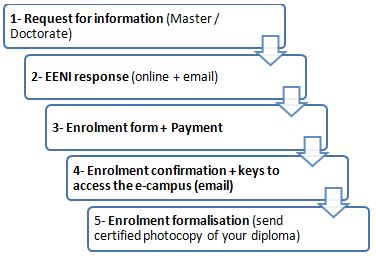

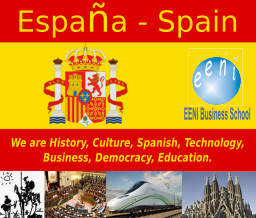
Objectives of the Bachelor of Science in International Trade.
General Objective
The Bachelor of Science in International Trade taught by EENI Global Business School is designed to provide the student with a global and practical vision of all topics related to international business: foreign trade, global marketing, internationalization of companies and languages for business.
specific objectives:
- To understand the principles and techniques of the foreign trade and international marketing
- To know how to collect and interpret information that allows the student to make decisions in the world of international business
- To know how to use quantitative methods applied to international business
- To develop a sufficient communication capacity to transmit information, ideas and solutions related to business
- To develop the capabilities in all operations related to foreign trade and international marketing
- To know how to incorporate intercultural negotiation strategies in international relations, to create and implement an strategy of internationalization, as well as to know the basic concepts of the foreign direct investment
- To be able to apply the professional knowledge learned in student's future jobs
- To master languages for business
Take advantage of the job opportunities offered by the world of international business!
Job Opportunities Related to the Bachelor of Science
With a Bachelor of Science in International Trade, the future graduates will be able to efficiently develop their responsibilities in exporting and importing companies, Organizations related to the international trade, private and public institutions related to the internationalization, and even in personal companies.
- Executive positions: Export Director, International Department Manager, International Projects Director, Executive Director of Sales and Development, Manager of Import and Export Sales, etc
- Intermediate positions: Export Manager, International Investment Coordinator, International Bank Departments, Foreign Trade Consultant, Foreign Client Manager, Export Assistant, etc. And many other works
Structure of the Bachelor of Science in International Trade taught by EENI Global Business School.
| Subjects of the Bachelor of Science in International Trade | ECTS |
| First Year (60 ECTS) | |
| First Semester | |
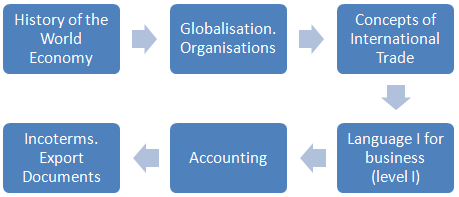 |
|
| 1. History of the World Economy.
Geography of the World Evolution of the World Economy, Economic Policy... |
7 |
| 2.
Globalization and International Organizations WTO, World Bank, IMF, UN... |
6 |
| 3. Key concepts related to the international trade | 3 |
| 4. Language I for Business (level I) | 6 |
| 5. Introduction to Accounting How to interpret balance sheets and income statements, structure of accounts, patrimonial elements |
4 |
| 6. Incoterms. Import/Export Documents Introduction to the Incoterms® 2020, news Incoterms® 2020, how to fill the import/export documents |
4 |
| Second Semester | |
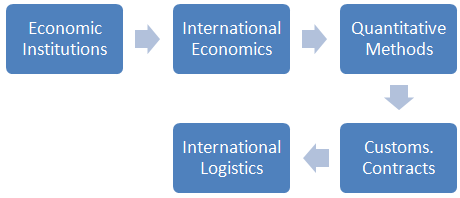 |
|
7. Economic Organizations related to the region of the student.
The student must select only the Organizations of his region. Students from:
Notes:
|
7 |
| 8. Fundamentals of International Economics Supply and Demand, Market Equilibrium, Macroeconomics and Microeconomics |
6 |
| 9. Quantitative Methods applied to International Business Two-dimensional Descriptive Analysis, Application of Statistics |
6 |
| 10. Customs. International Contracts Customs and Import/Export Procedures, Customs Clearance, International Contracts, Risks of International Trade, United Nations Commission on International Trade Law (CNUDCI)... |
6 |
| 11. International Transport and Logistics
(structure) International Transport Chain, maritime transport, air, highway, railway, Multimodal Transport, documents, costs and insurance of International Transport, export packaging... |
5 |
| Second Year (60 ECTS) | |
| Third Semester | |
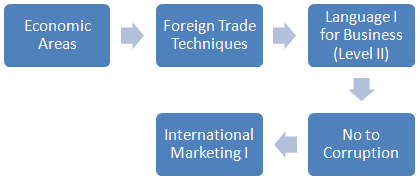 |
|
12. Economic Areas. The student must select only the economic areas of his region. Students from:
|
5 |
| 13. Techniques of the foreign trade Documentary credit, Methods of Payment, International Finance, finance credits, FOREX, International Trade in services, General Agreement on Trade in Services (AGCS), Doha Development Round... |
10 |
| 14. Language I for Business (level II) | 6 |
| 15.
No to Corruption in International Trade (structure) Global Compact of the UN, Transparency International, Anti-corruption clause of the ICC... |
4 |
| 16. International Marketing I Introduction to the international marketing, International Market Research, Export Department... |
5 |
| Fourth Semester | |
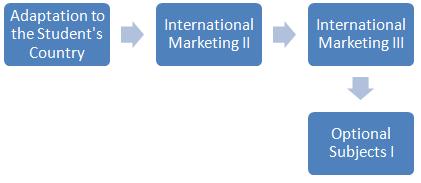 |
|
| 17.
Adaptation of the Bachelor of Science to the country of the student Study of the main Economic Organizations as well as the Free Trade Agreements of the country of the student:
|
5 |
| 18. International Marketing II
(PDF
- Marketing II and III) Product policy, export prices, prices and Incoterms® 2020, international distribution, direct exports, Sales Network Management, Importers and Distributors... |
8 |
| 19. International Marketing III Local, regional and global promotion strategies, international trade shows, Country Brand, criteria of the international market segmentation, International Brand Strategy, international positioning strategies... |
9 |
| Optional Subjects I * | 8 |
| Third Year (60 ECTS) | |
| Fifth Semester | |
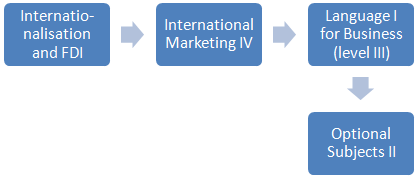 |
|
| 20. strategies of internationalization and FDI Value chain, strategies of internationalization, FDI, sales delegations, joint ventures... |
6 |
|
21. International Marketing IV E-business and International Trade, new digital economy, E-business models, Intercultural Management, high and low context cultures... |
6 |
| 22. Language I for Business (level III) | 6 |
| Optional Subjects II * | 12 |
| Sixth semester | |
 |
|
| 23. Language II for Business (level I) | 6 |
| Optional Subjects III * | 5 |
| Final Work of the Bachelor of Science | 12 |
(*) Optional Subjects: to choose from the following list of subjects.
- Economic Area of the Western Civilization [8]
- Islamic Economic Area [8]
- Hindu Economic Area [3]
- Buddhist Economic Area [3]
- Orthodox Economic Area [3]
- African Economic Area [7]
- Introduction to Christianity [4]
- Introduction to Islam [4]
- African Civilization [4]
- Indian Religions [4]
- Chinese Religions [3]
- European Union [3]
- European Single Market [4]
- International EU Relations [8]
- Business in Russia 1 [4]
- Business in Russia 2 [4]
- Business in China 1 [6]
- Business in China 2 [6]
- Business in China 3 [6]
- Business in China 4 [6]
- Business in India 1 [6]
- Business in India 2 [6]
- Business in India 3 [6]
- Business in India 4 [6]
- African Economic Transformation [5]
- African Business and Economy [5]
- Transport corridors and African ports [10]
- International Relations of Africa [10]
- Economic African integration [8]
- Language II for Business (level II) [6]
- Language III for Business (level I) [6]
- Language III for Business (level II) [6]
- Sports, cultural, cooperative or representative activities of students [4]
- Students Mentor [4]
- The student can select many more optional subjects from those shown on this list
Notes:
- PDF: Download the syllabus and objectives of the module
- Between []: ECTS = European Transfer and Accumulation System
Students Clément Lonfo and Christelle Yameogo (Burkina Faso)
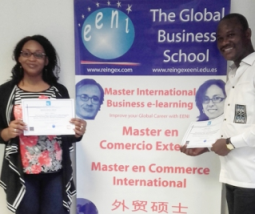
(c) EENI Global Business School (1995-2024)
We do not use cookies
Top of this page




